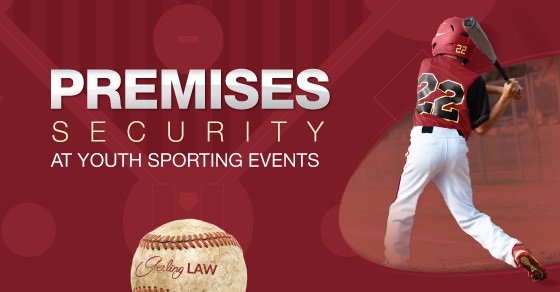Little League and Soccer Teams are Filling Up
Now that spring and summer sports are in full swing, many of us will be spending a great deal of time at the sports park – playing, coaching, or cheering our favorite player. For some, the ballfield becomes a second home, where it seems they spend most of their free time. If you’ve got a little leaguer or soccer star, you know the sports park like the back of your hand – where the shady spots are, how much the food costs at the concession stand, and the best parking spot – but you may not give a second thought to the safety and security of the property.

Baseball Field Safety and Responsibility
Often you don’t hear about problems at the sports park unless it’s something that attracts the attention of the news – a baseball coach or spectator hit by an errant ball … a small child disappearing … a bench-clearing brawl. Most days it’s just business as usual, and everyone goes home healthy and happy. It’s easy to forget that the owner of that property has a responsibility to provide a reasonable level of safety for patrons while they are on the property. As an attendee at a sports park, you have a right to expect:
- Adequate lighting
- Properly maintained grounds
- Adequate security
- Appropriate crowd management structures, including established walkways and fencing or other barriers
- Appropriate staffing for the venue during an event
- Adequate restroom facilities
- Proper signage indicating entrances/exits as well as directional signage for facilities
- Handicap-accessible areas such as entrances and restrooms
- Appropriate contingency planning for emergencies
- A way to communicate to the crowd in the event of an emergency (i.e., PA system)
Assumption of Risk and Limits to Liability
It’s almost a cliché when a car window gets broken by a foul ball, but what is the responsibility of the sports park property owner in such an instance?
It’s almost a cliché when a car window gets broken by a foul ball, but what is the responsibility of the sports park property owner in such an instance?
Even though local laws may require a property owner to provide such things as basic security and safety at an outdoor venue such as a sports park, there is a certain amount of responsibility for personal property that belongs to the individual. Damage to a car hit by a foul ball is the responsibility of the car’s owner, who chose to park in a particular spot.
A spectator hit with a foul ball is a different circumstance, depending on where the spectator was seated during the game. Seats located behind home plate are generally protected with netting or fencing; those choosing to sit in an unprotected area are understood to be under an assumption of risk, which limits the liability of the property owner for injuries.
Proving Negligence
If you or a loved one are injured while attending a game or visiting a sports venue, you may have some legal recourse – provided you can prove negligence on the behalf of the property owner and/or organization or team involved. Proof of negligence has four distinct elements:
- Duty to public – Proving that a property owner or other responsible party had a duty to the public to provide a safe environment and reasonable security for the event, and that they were negligent in doing so.
- Breach of duty – When the responsible party fails to uphold that duty – for instance, by not properly maintaining their facility – it can be said that they have breached their duty.
- Cause of injury – Following the establishment of duty and the determination that there was failure to uphold that duty, it must be established that this breach was the cause of your injury.
- Injury caused by breach – If you suffered an injury or damage as a result of the breach of duty, and this injury is compensable with monetary damages, you must be able to prove that this injury was a result of negligence.
While there are no universal requirements for venues such as sports parks, federal, state, and local laws outline the requirements for premises security for many types of public facilities. Property owners have a responsibility to provide a safe and secure environment for people on their premises, and if you experience personal property damage or personal injury while at a sports facility, you need to know what your legal rights are. An attorney with experience in premises liability cases can examine the facts of your case and determine if you have legal recourse.
Don’t let a foul ball or a damaged car ruin your enjoyment of the ball park – contact Gerling Law today!
